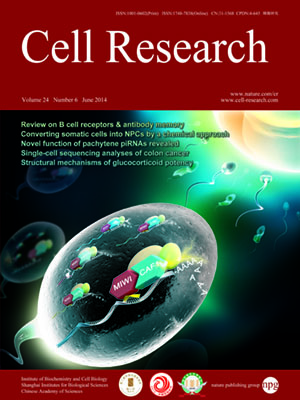
Volume 24, No 6, Jun 2014
ISSN: 1001-0602
EISSN: 1748-7838 2018
impact factor 17.848*
(Clarivate Analytics, 2019)
Volume 24 Issue 6, June 2014: 770-773
LETTERS TO THE EDITOR
Production of bioactive ginsenoside compound K in metabolically engineered yeast
Xing Yan1,*, Yun Fan1,3,*, Wei Wei1,*, Pingping Wang1,*, Qunfang Liu2, Yongjun Wei1, Lei Zhang1, Guoping Zhao1,3,4,5, Jianmin Yue2 and Zhihua Zhou1
1CAS-Key Laboratory of Synthetic Biology, Institute of Plant Physiology and Ecology, Shanghai Institutes for Biological Sciences, Chinese Academy of Sciences, Shanghai 200032, China
2State Key Laboratory of Drug Research, Institute of Materia Medica, Shanghai Institutes for Biological Sciences, Chinese Academy of Sciences, Shanghai, 201203, China
3State Key Laboratory of Genetic Engineering, Department of Microbiology, School of Life Sciences and Institute of Biomedical Sciences, Fudan University, Shanghai 200032, China
4Shanghai-MOST Key Laboratory for Health and Disease Genomics, Chinese National Human Genome Center, Shanghai 201203, China
5Department of Microbiology and Li KaShing Institute of Health Sciences, The Chinese University of Hong Kong, Prince of Wales Hospital, Shatin, New Territories, Hong Kong SAR, China
Correspondence: Zhihua Zhou, Tel: 86-21-54924050, Fax: 86-21-54924049 E-mail: zhouzhihua@sippe.ac.cn; Jianmin Yue, Tel/Fax: 86-21-50806718 E-mail: jmyue@mail.shcnc.ac.cn; Guoping Zhao, Tel/Fax: 86-21-54924002(gpzhao@sibs.ac.cn)
Ginseng has been traditionally used as herbal medicine in Asia for thousands of years to enhance physical performance and to increase resistance to stress and aging, and has been developed into various kinds of dietary supplement with increasing market demand1. Its active constituents are ginsenosides, a group of triterpene saponins (ca. 2% in Panax ginseng dried roots)1. However, the main functional component detected in mammalian blood or organs after oral administration of ginseng or ginsenosides is compound K (CK)2, which presents bioactivities of anti-inflammation, hepatoprotection, anti-diabetes and anti-cancer in experiments of in vitro cell biology and/or in vivo animal models (Supplementary information, Table S1). Recently, CK was approved by the China Food and Drug Administration to commence clinical trials (CDEL20130379) for arthritis prevention and treatment.
10.1038/cr.2014.28
FULL TEXT | PDF
Browse 2871


